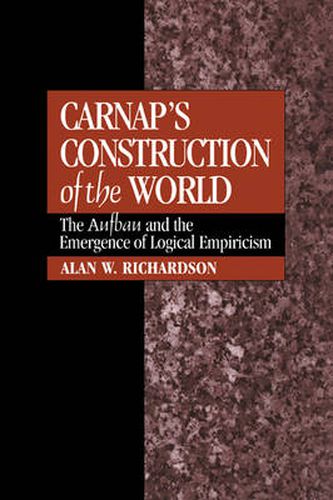Readings Newsletter
Become a Readings Member to make your shopping experience even easier.
Sign in or sign up for free!
You’re not far away from qualifying for FREE standard shipping within Australia
You’ve qualified for FREE standard shipping within Australia
The cart is loading…






This book is a major contribution to the history of analytic philosophy in general and of logical positivism in particular. It provides the first detailed and comprehensive study of Rudolf Carnap, one of the most influential figures in twentieth-century philosophy. The focus of the book is Carnap’s first major work: Der logische Aufbau der Welt (The Logical Structure of the World). It reveals tensions within the context of German epistemology and philosophy of science in the early twentieth century. Alan Richardson argues that Carnap’s move to philosophy of science in the 1930s was largely an attempt to dissolve the tension in his early epistemology. This book fills a significant gap in the literature on the history of twentieth-century philosophy. It will be of particular importance to historians of analytic philosophy, philosophers of science, and historians of science.
$9.00 standard shipping within Australia
FREE standard shipping within Australia for orders over $100.00
Express & International shipping calculated at checkout
This book is a major contribution to the history of analytic philosophy in general and of logical positivism in particular. It provides the first detailed and comprehensive study of Rudolf Carnap, one of the most influential figures in twentieth-century philosophy. The focus of the book is Carnap’s first major work: Der logische Aufbau der Welt (The Logical Structure of the World). It reveals tensions within the context of German epistemology and philosophy of science in the early twentieth century. Alan Richardson argues that Carnap’s move to philosophy of science in the 1930s was largely an attempt to dissolve the tension in his early epistemology. This book fills a significant gap in the literature on the history of twentieth-century philosophy. It will be of particular importance to historians of analytic philosophy, philosophers of science, and historians of science.